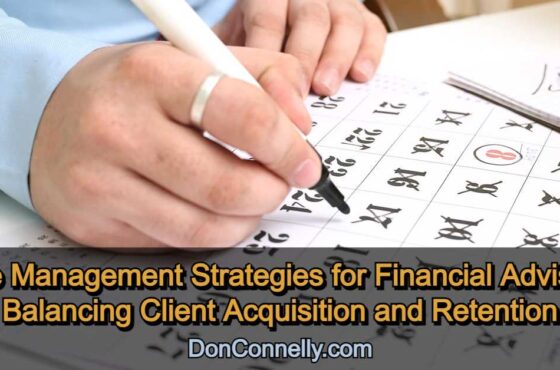How to Manage Your Emotions in Difficult Situations
 You know by now that I believe the development and use of certain soft skills contributes far more to our success than does the development and use of hard skills. Self-awareness is just such a soft skill. The importance of being aware of and controlling our emotions cannot be overstated.
You know by now that I believe the development and use of certain soft skills contributes far more to our success than does the development and use of hard skills. Self-awareness is just such a soft skill. The importance of being aware of and controlling our emotions cannot be overstated.
Smooth sailing is an interruption of the norm in the life of a Financial Advisor.
Watching over other peoples’ money is a constant vigil, fraught with the possibility of loss. Tumultuous markets, emotional clients and unexpected occurrences are standard fare. The only constant is change.
You can’t unplug your emotions. Neuroscientist Antonio Damasio calls emotions “that continuous musical line of our minds, the unstoppable humming.”
You certainly can’t control the markets, but you can and are expected to control your reaction to the markets. Your livelihood depends on it. You are paid to think clearly.
No matter how stressful the situation, clients expect you to be the leader.
They have hired you to worry about their money. You can’t let them down. You can’t panic and you can’t get depressed. The more the markets move against you, the more composure you must muster. How do you manage your emotions in difficult situations?
You do what all great leaders do.You always tell the truth.
A big part of the reason we trust doctors is that we believe they are honest with us. Of course some doctors try to soften the blow. They wouldn’t be human if they didn’t. But, as a profession, doctors are frank.
You come to terms with the situation. The biggest single waste of time on earth is wishing things were different.
You remain enthusiastic. Empathize, don’t sympathize. Clients will take their cues from your behavior. No matter how volatile the markets may get, your clients need to reach their goals. Just because the markets may have changed doesn’t mean the reasons they invested have changed.
Maintain your composure. There is light at the end of the tunnel.
The New York Stock Exchange came into existence in 1792. The Dow Jones Industrial Average has been around since 1882. Since 1882, the Dow has come back every single time it has gone down. It has subsequently gone on to hit new highs. This, too, shall pass.
Decide what to do and do it.
Speak decisively. Don’t say, “Here’s what I think we should do.”
The key to proper behavior in times of strife is experience. The more times you’ve been through it, the calmer you will be.
But what if you don’t have that experience? You develop and practice a ‘what if’ scenario.
Write your bear market presentation in a bull market. Don’t file it away. Practice it.
What other ‘what if’ scenarios might there be? How about a client telling you he or she is not happy with your service and is considering another Advisor? Write a presentation and practice it. What about your client unhappy that your performance lags the market? You got it. Write a presentation and practice it.
We’re really talking about poise under pressure.
Poise can be developed. Who do you know who’s calm under fire? Ask that person for thirty minutes. It will be time well-spent for both of you.



